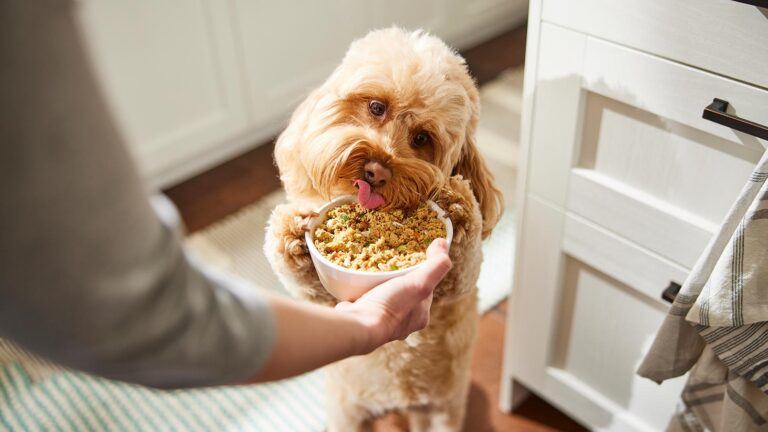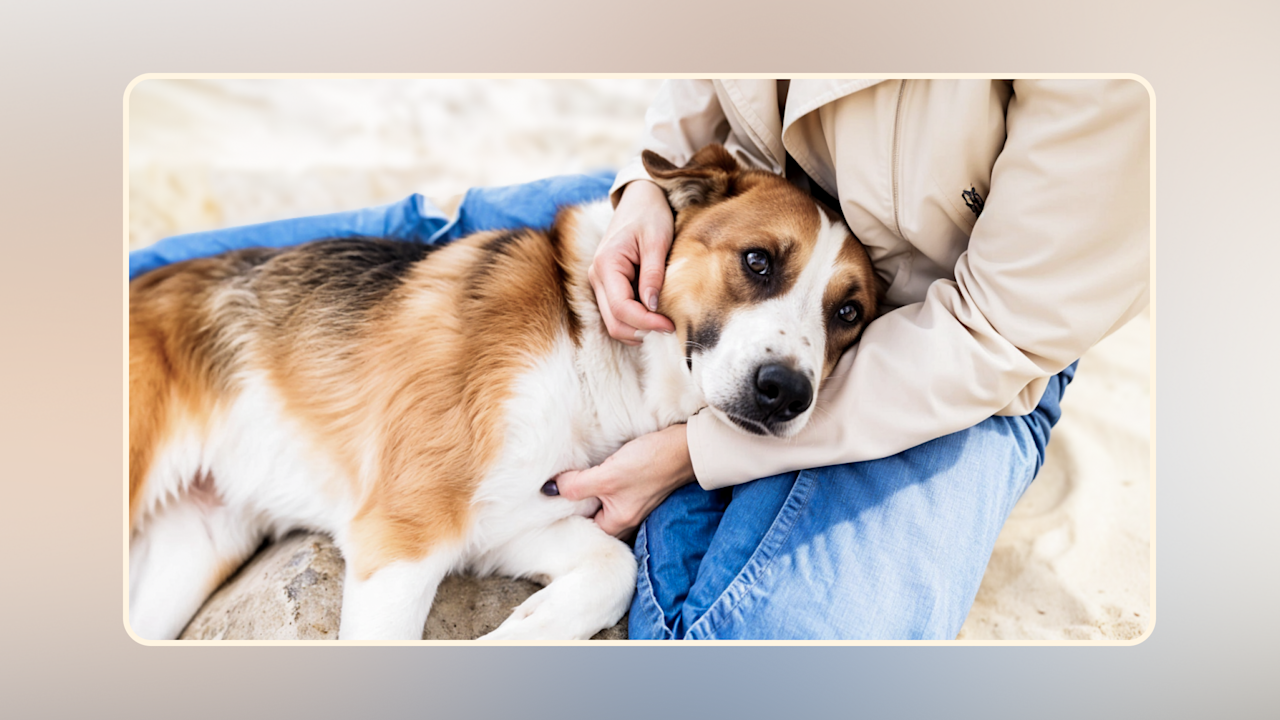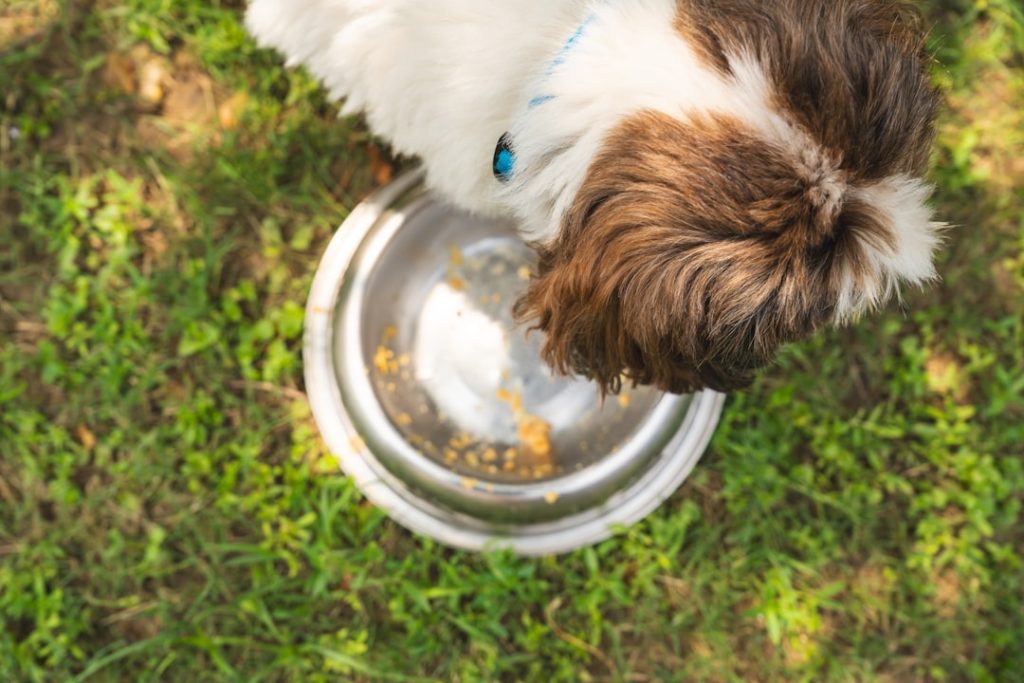If your dog is dealing with vomiting and diarrhea, you’re probably worried and wondering what you should feed them. It’s tough to see your furry friend uncomfortable and unsure about the right food can make things feel even harder.
But don’t worry—knowing what to give your dog can help soothe their stomach and speed up their recovery. You’ll discover simple, effective feeding tips that can make a big difference in your dog’s health. Keep reading to learn exactly what to feed your dog when they’re feeling sick, so you can help them get back to their happy, energetic self.
Causes Of Vomiting And Diarrhea In Dogs
Vomiting and diarrhea in dogs are common signs of digestive upset. These symptoms can happen for many reasons. Knowing what causes them helps in deciding the best care.
Some causes are mild and fix on their own. Others need quick medical attention. Understanding these causes is important for your dog’s health.
Common Triggers
- Eating spoiled or toxic food
- Sudden changes in diet
- Swallowing foreign objects
- Infections from bacteria, viruses, or parasites
- Food allergies or intolerances
- Stress or anxiety
- Chronic illnesses like kidney or liver disease
- Medications that upset the stomach
When To See A Vet
Seek veterinary care if vomiting or diarrhea lasts more than 24 hours. Watch for signs like:
- Blood in vomit or stool
- Severe lethargy or weakness
- Repeated vomiting or diarrhea
- Dehydration symptoms, such as dry gums or sunken eyes
- Abdominal pain or bloating
- High fever
- Inability to keep water down
Early vet visits prevent serious health problems. Always trust your instincts about your dog’s condition.

Credit: www.chewy.com
Hydration Needs
Dogs with vomiting and diarrhea lose fluids fast. Staying hydrated is key to their recovery. Fluids help replace what their body loses. Without enough water, dehydration can become serious quickly. Monitoring hydration needs supports healing and comfort.
Importance Of Fluids
Fluids keep your dog’s body balanced. They help maintain blood pressure and organ function. Vomiting and diarrhea cause water and important salts to leave the body. This loss can lead to weakness and confusion. Proper hydration prevents these dangerous effects. It also helps flush out toxins from the stomach.
Safe Hydration Options
Plain, fresh water is the best choice for hydration. Offer small amounts frequently instead of large bowls at once. Some dogs may need extra help with fluids.
- Oral rehydration solutions made for pets replace salts and minerals safely.
- Broth without onions or garlic adds flavor and nutrients.
- Ice chips can encourage drinking in reluctant dogs.
Avoid sugary drinks, caffeine, or anything with artificial sweeteners. These can worsen symptoms. Always check with a vet before giving any special fluids. Proper hydration supports your dog’s fast and safe recovery.
Initial Feeding Guidelines
Knowing the right way to feed a dog with vomiting and diarrhea is vital. The initial feeding guidelines help the dog’s stomach rest and recover. Careful feeding supports better digestion and reduces discomfort. Follow these basic steps to start feeding safely after a sick episode.
Fasting Period
Pause feeding for 12 to 24 hours to allow the stomach to settle. This fasting period helps reduce nausea and gives the gut time to heal. Always keep fresh water available to prevent dehydration. Avoid forcing the dog to eat during this time. If vomiting continues after fasting, contact a vet immediately.
Small, Frequent Meals
After fasting, introduce small amounts of bland food. Feed little portions every 3 to 4 hours to avoid overloading the stomach. Bland foods like boiled chicken and rice are gentle on the digestive system. Gradually increase the meal size as the dog improves. Watch for signs of discomfort or return of symptoms. Adjust feeding amounts based on how the dog responds.
Safe Foods For Recovery
Choosing safe foods helps your dog heal faster after vomiting and diarrhea. These foods are gentle on the stomach and provide needed nutrients. They also help restore normal digestion without causing more upset.
Start with small portions and watch how your dog reacts. Keep meals plain and avoid spices, oils, or additives. Hydration remains very important alongside feeding.
Boiled Chicken And Rice
Boiled chicken and rice is a classic recovery meal. The chicken offers lean protein that supports healing. White rice gives easy-to-digest carbohydrates that add energy.
- Use skinless, boneless chicken breast.
- Boil until fully cooked, no seasoning.
- Cook rice plain without butter or salt.
- Mix in a 1:2 ratio of chicken to rice.
This combination soothes the stomach and helps firm stools.
Pumpkin And Sweet Potato
Both pumpkin and sweet potato are rich in fiber. Fiber helps regulate bowel movements and ease diarrhea. They also contain vitamins that support the immune system.
- Use plain canned pumpkin, not pumpkin pie mix.
- Cook and mash sweet potatoes without seasoning.
- Serve small amounts to avoid gas or bloating.
This mix promotes gentle digestion and stool health.
Plain Yogurt And Cottage Cheese
Plain yogurt and cottage cheese add probiotics and protein. Probiotics restore good bacteria in the gut. Protein helps repair body tissues.
- Choose plain, unsweetened yogurt with live cultures.
- Use low-fat or fat-free cottage cheese.
- Offer in small portions to test tolerance.
These dairy options can calm the digestive tract and support recovery.
Foods To Avoid
Choosing the right foods for a dog with vomiting and diarrhea is crucial. Certain foods can worsen their condition and delay recovery. Avoid feeding anything that irritates their stomach or is hard to digest. Focus on gentle options and keep harmful foods off the menu.
Fatty And Spicy Foods
Fatty foods can upset your dog’s stomach further. They are hard to digest and may cause more vomiting or diarrhea. Avoid giving fried foods, greasy meats, and anything cooked with oil or butter. Spicy foods irritate the digestive tract. They can lead to stomach pain and worsen symptoms quickly. Keep your dog away from spicy sauces, peppers, and seasonings.
Dairy And Human Snacks
Many dogs cannot digest dairy well. Milk, cheese, and ice cream often cause diarrhea or stomach upset. Human snacks like chips, cookies, and candy contain salt, sugar, and additives. These ingredients harm a sick dog’s sensitive stomach. Avoid giving your dog table scraps or processed treats during illness. Stick to plain, vet-approved foods to help them heal faster.
Credit: www.californiadogkitchen.com
Transitioning Back To Regular Diet
Transitioning your dog back to their regular diet after vomiting and diarrhea requires patience and care. Rushing this process can upset their stomach again, undoing the progress you’ve made. The goal is to help your dog’s digestive system adjust slowly without causing further discomfort.
Gradual Food Changes
Start by mixing a small amount of your dog’s regular food into the bland diet they’ve been eating. Increase the regular food portion gradually over several days while decreasing the bland diet. This slow shift helps your dog’s stomach adapt without triggering more vomiting or diarrhea.
For example, you might begin with 25% regular food and 75% bland diet. After a few days, try 50/50, then 75/25, until your dog is back on their normal meals. This step-by-step approach reduces the risk of digestive upset.
Monitoring Tolerance
Watch your dog closely during the transition for any signs of discomfort like vomiting, diarrhea, or lethargy. Keep a daily log of their eating habits and bathroom routines to spot patterns quickly. If symptoms return, slow down the transition or return to the bland diet for a bit longer.
Ask yourself: Is my dog eating happily and showing normal energy? If not, it’s a sign to pause and adjust. Remember, each dog’s tolerance is different, so tailor the pace to their unique needs.
Supplements And Remedies
Supplements and remedies play a crucial role when your dog is dealing with vomiting and diarrhea. These conditions upset their digestive system, and adding the right supplements can help restore balance faster. While food changes are important, supplements provide extra support to soothe and heal your dog’s gut effectively.
Probiotics Benefits
Probiotics are friendly bacteria that help rebuild your dog’s natural gut flora, especially after illness. They can reduce the duration of diarrhea and improve stool consistency by fighting harmful bacteria.
Many dog owners notice a quick improvement after adding probiotics to their pet’s diet. You can find probiotics in powders, capsules, or even certain yogurts made specifically for dogs. Just remember, not all probiotics are the same—look for products designed for pets to ensure safety and effectiveness.
Have you ever wondered why your vet recommends probiotics after antibiotics? That’s because antibiotics often wipe out good bacteria along with bad ones. Probiotics help restore this balance and improve digestion, making your dog feel better faster.
When To Use Medications
Medications for vomiting and diarrhea should be used carefully and only when necessary. If your dog’s symptoms last more than 24 hours or are severe, it’s time to consult your vet.
Over-the-counter remedies might help mild cases, but some medications can be harmful if used without veterinary advice. Your vet may prescribe anti-nausea drugs, antidiarrheals, or antibiotics depending on the cause.
Think about your dog’s overall health and behavior—are they lethargic or refusing water? These signs often indicate a need for professional treatment rather than just home remedies. Always prioritize your pet’s safety by asking your vet before giving any medicine.
Preventive Measures
Preventing vomiting and diarrhea in dogs begins long before symptoms appear. Careful attention to what and how you feed your dog can make a huge difference. Small habits in daily care protect your dog’s digestive health and keep those unsettling moments at bay.
Safe Food Storage
Storing your dog’s food correctly is crucial. Exposure to heat, moisture, or air can spoil food, leading to stomach upset. Always keep dry kibble in airtight containers to maintain freshness.
If you use homemade meals or wet food, refrigerate leftovers promptly and never leave food out for more than two hours. Have you noticed how quickly canned food can change smell and texture when left open? That’s a red flag for bacterial growth.
Regularly check expiration dates on all pet foods. Feeding expired food is a common mistake many owners overlook, but it can cause serious digestive issues.
Avoiding Toxic Substances
Many common household items and foods can harm your dog’s stomach. Chocolate, grapes, onions, and certain artificial sweeteners are notorious for causing vomiting and diarrhea. Keep these well out of reach.
Cleaning products, medications, and plants like lilies or azaleas can also be toxic if ingested. Have you ever considered how curious your dog might be about a forgotten pill or spilled cleaner? It’s safer to store these items in locked cabinets.
Even some dog treats or supplements, if given in excess or from unreliable sources, can upset your dog’s digestive system. Always read labels and consult your vet before introducing new foods or supplements.

Credit: wefeedraw.com
Frequently Asked Questions
What Foods Are Safe For Dogs With Vomiting And Diarrhea?
Safe foods include boiled chicken, white rice, and plain pumpkin. These are gentle on the stomach and help firm stools. Avoid fatty or spicy foods until symptoms improve.
How Long Should I Withhold Food From A Vomiting Dog?
Withhold food for 12 to 24 hours to let the stomach rest. Provide small amounts of water to prevent dehydration during this period.
Can I Give My Dog Probiotics During Diarrhea?
Yes, probiotics help restore healthy gut bacteria and improve digestion. Consult your vet for the right type and dosage for your dog.
When Should I See A Vet For My Dog’s Vomiting?
Visit the vet if vomiting lasts over 24 hours or if your dog shows lethargy, blood in vomit, or severe diarrhea. Immediate care may be necessary.
Conclusion
Caring for a sick dog requires patience and careful food choices. Offer bland foods like boiled chicken and rice. Small, frequent meals help digestion. Avoid rich, fatty foods. Ensure your dog drinks enough water. Dehydration can worsen symptoms. Monitor your pet’s condition closely.
Consult a vet if symptoms persist. Professional advice ensures proper treatment. Your dog’s health is important. Providing the right nutrition aids recovery. Keep your furry friend comfortable and supported. A gentle approach helps them heal faster. Remember, a loving environment promotes well-being.
Stay attentive and adjust their diet as needed. Your dog will appreciate your care.

